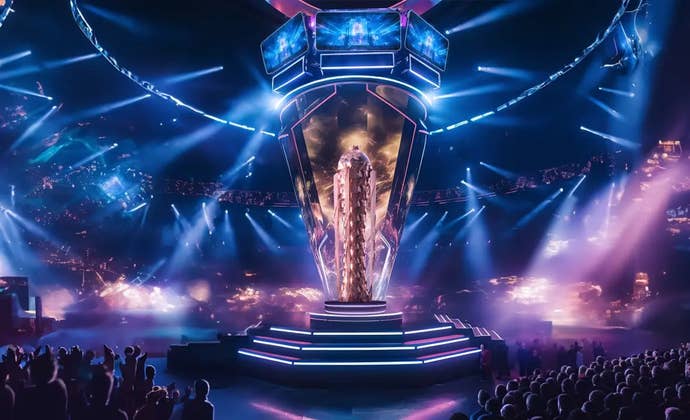First F1, the World Cup, and golf – now esports: gaming’s biggest ever sports-washing tournament starts today
Life changing money, courtesy of the Saudi Arabian Public investment Fund.
The Esports World Cup has begun, bringing many of the most popular competitive games under one roof in Riyadh, Saudi Arabia. This kicks off an almost two month-long battle over ridiculous amounts of prize money, which a vast majority of esports teams and competitors are fighting for.
This prize money - over $60 million across all games - stems entirely from the Saudi Arabian Public Investment Fund (PIF), making the Esports World Cup the largest government-funded esports event of all time. This in turn has raised serious concerns about sports-washing - a form of propaganda accomplished through hosting sporting events, sponsoring teams, and generally throwing money around in a chosen sporting scene.
The Saudi Arabian government has come under serious scrutiny from entities such as Amnesty International for its history of human rights offenses. In 2023 alone it granted individuals that protested peacefully lengthy prison sentences, gave the death penalty to others, and conducted various crimes against migrants at its borders, including killings.
Esports would not be the first avenue for such investment from the Saudi Arabian government. The Public Investment Fund we mentioned earlier was used to make huge waves in the golf space, putting the Saudi government in the driver seat of the Liv Golf series. It also has a controlling stake in various football teams, established a state in a UFC competitor, and placed its fingers in numerous other pies.
One could argue that, in the case of esports, this is part of the country's attempts to diversify its portfolio away from a dependance on oil, as stated outright in the countires Vision 2030 plan. While this could make sense for some gaming investments, like the lucrative acquisition of Monopoly Go developer Scopely by the Saudi Arabian Savvy Gaming Group, esports has historically been hard-pressed to actually generate income.
In a 2015 study, EEDAR found that CS:GO fans were among the biggest spenders, dropping an eye-watering $6.16 each. That's enough for maybe two pints, and that's on the higher end of things, recorded before the current recession many esports fans find themselves in right now. Esports, generally speaking, hasn't made money.

With this in mind, the sheer amount of prize money being thrown at the esports world cup doesn't make sense in a profit-generating sense. The opening show on Twitch surpassed 1.1 million views – which certainly is a lot – but it, and ticket sales, will hardly make up a $60 million investment. The event is being run to make Saudi Arabia look like the future home of gaming, and the Saudi Arabian government look cool, and hip: a government that understands what its younger generation wants.
But why should you care? If you're an average person who loves League of Legends or Street Fighter 6, and are excited to see your favourite players battle it out on-stage, how does this affect you? Well, there are the obvious moral implications here. Many teams, players, and commentators have boycotted the Esports World Cup, and it's not out of some xenophobic slight against the people of Saudi Arabia. People may not be able to choose where they are born, and what government they pay taxes to, but they can control whose money they take. You can control who you work with.
Let's clarify with a hypothetical. The UK is about to endure an election, and it looks like Kier Starmer's Labour Party will win. In the aftermath, if Kier was to announce the Starmer Street Fighter Slamdown, paying out competitors and staff with government money, those who attend in a professional capacity would be working with the UK government on an event created to make the UK government look good. That's the same UK government that still supports the genocide occuring in Gaza right now, by the way. And in Kier's case, a government that'll continue pushing regressive policies against the trans community. I would not work at that event, because those two factors (and others) go against my morals. The same situation can be extrapolated in Saudi Arabia.

But hey, let's say you genuinely don't care about that sort of stuff and just want esports to do well. It's also short sighted! We've seen esports teams go through an "esports winter" in recent years as investment money dries up, in large part due to the unprofitability of the space. Instead of rolling up their sleeves and working on a path of sustainability, the industry at large has found another teat to suckle on, kicking the financial can down the road and not thinking about long term sustainabiliuty.
This means that the teams have been able to hire a wave of new players to take part in the esports world cup, yes – but it also means that if the Saudi Government decides to turn the money tap off, these same players will be dropped on a dime. Pumped and dumped for a quick payout. Not exactly a stable foundation to build upon.
It's a weird, sad period in the history of competitive gaming. Many are leaping at the EWC for a chance at a huge paycheck (people have rent to pay, I get it), but I can't help but think of the companies participating. Those who gladly raise pride flags one month, then take cash of a country where it is illegal to exist as a homosexual person as soon as the calendar page is turned. It paints a depressing, and telling, picture. And the gaming public has taken note.

